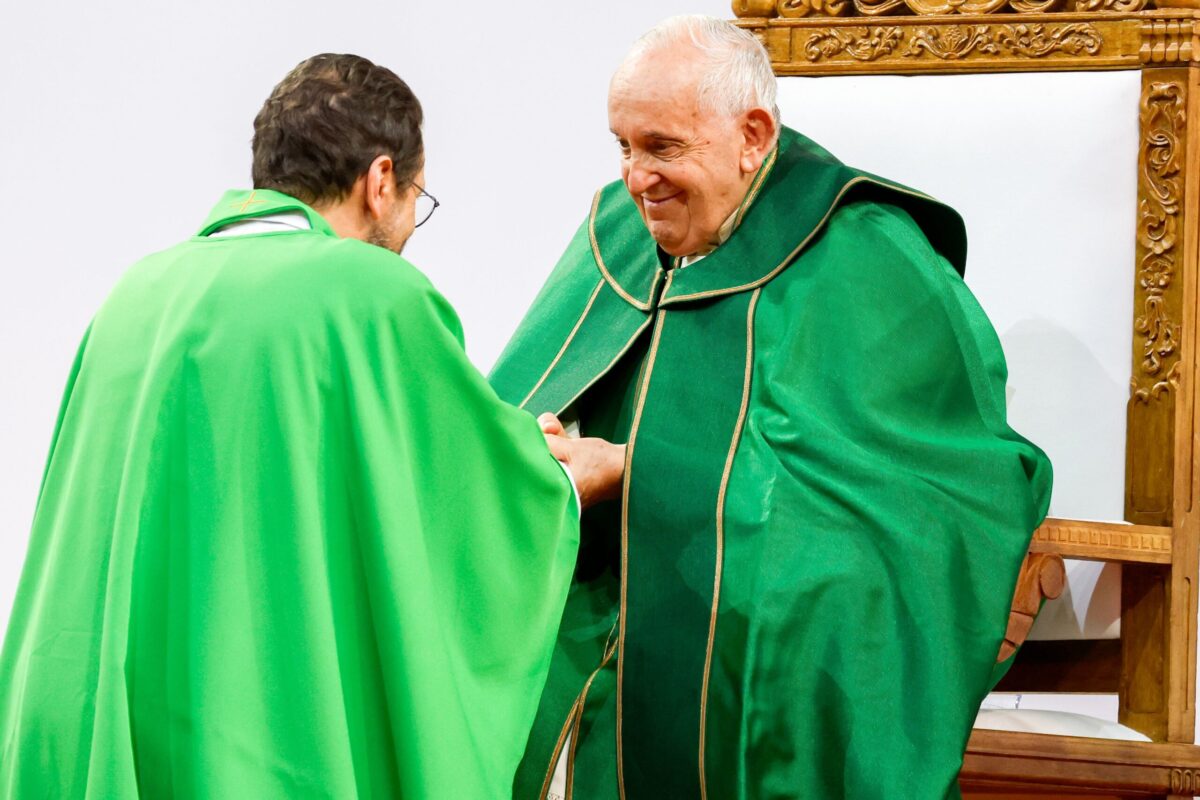By Cindy Wooden, Catholic News Service
ULAANBAATAR, Mongolia (CNS) — Like the land struck by a “zud,” the human heart has a thirst and longing that can be alleviated only by the God of love, Pope Francis told Mongolians gathered for Mass in Ulaanbaatar’s Steppe Arena.
Countless generations of Mongolians have feared the “zud,” an extreme weather event of drought or impenetrable ice, that decimates herds and flocks.
In his homily at the Mass Sept. 3, Pope Francis emphasized the day’s response to Psalm 63: “My soul is thirsting for you, O Lord my God.”
“We are that dry land thirsting for fresh water, water that can slake our deepest thirst,” the pope said. “Our hearts long to discover the secret of true joy, a joy that even in the midst of existential aridity, can accompany and sustain us.”
Every person thirsts for happiness, for direction and for meaning in life, he said. But “more than anything, we thirst for love, for only love can truly satisfy us, bring us fulfillment, inspire inner assurance and allow us to savor the beauty of life.”
“Dear brothers and sisters,” he told the estimated 2,000 people in the arena, “the Christian faith is the answer to this thirst; it takes it seriously, without dismissing it or trying to replace it with tranquilizers or surrogates.”
The Mongolian Catholic community numbers only about 1,450, but hundreds of Catholics from throughout Central Asia traveled to Ulaanbaatar for the papal Mass. While the Chinese government refused to allow any Catholic bishop or priest from the mainland to attend, small groups of lay Catholics managed to cross the border to see the pope, and official church delegations arrived from Hong Kong and Macau.
Riding around the perimeter of the small arena in a golf cart, Pope Francis stopped and waved at a group that held up a large Chinese flag.
Bishops and pilgrims also came from South Korean and Vietnam, including a dance troupe that performed for the crowd that gathered hours before Mass. When the pope arrived, the Vietnamese dancers rushed to the crowd barriers, waving their conical straw nón lá hats.
Sisters of St. Charles Borromeo Iustyna Gurevich and Elena Sachenko said they spent two days driving to Ulaanbaatar with 20 pilgrims from Irkutsk, Krasnoyarsk and Khabarovsk, Russia, for the papal Mass.
Among the prayers of the faithful at the Mass were one read in Russian and another in Chinese.
The Russian-language prayer was for government leaders that “the wisdom that comes from heaven would teach them to care for the common good, overcoming conflicts and working for peace among peoples and safeguarding our common home.”
The prayer in Chinese was for those who are suffering that God, “who abandons nothing that he created, would console them in their time of trial and make us ready to give fraternal service.”
Kim Viet Ngo, a Vietnamese-American Catholic from Washington, D.C., said the Mass was an opportunity to see and pray with Pope Francis close up — closer than she would ever get to him at the Vatican.
“As a Catholic, I believe the pope can change the world, Vietnam included,” she said. For decades the Vatican and Vietnam’s communist government have been making slow progress in normalizing relations and coming to agreements on the appointment of bishops.
While small makeshift confessionals were set up outside the arena where missionaries offered the sacrament before the liturgy began, not everyone who came to the Mass was Catholic. In fact, a group of Buddhist monks dressed in saffron robes were seated on the arena floor in a place of honor.
Pope Francis led the Mass prayers in English, something he does rarely.
But he preached in Italian, telling the small crowd that “the heart of the Christian faith” is that “God, who is love, has drawn near to you in his son Jesus, and wants to share in your life, your work, your dreams and your thirst for happiness.”
Even when one feels like a “dry and weary land where there is no water,” as the Psalm says, it is still true that “God cares for us and offers us clear, refreshing water, the living water of the Spirit, springing up within us to renew us and free us from the risk of drought. Jesus gives us that water.”
Pope Francis told the small Catholic flock of Mongolia not to be fooled into thinking that “success, power or material things suffice to satisfy the thirst in our lives,” because that is what the world tries to make people believe.
But “that kind of worldliness leads nowhere; indeed, it leaves us thirstier than before,” he said.
“At the heart of Christianity is an amazing and extraordinary message,” the pope said. “If you lose your life, if you make it a generous offering, if you risk it by choosing to love, if you make it a free gift for others, then it will return to you in abundance, and you will be overwhelmed by endless joy, peace of heart and inner strength and support.”






